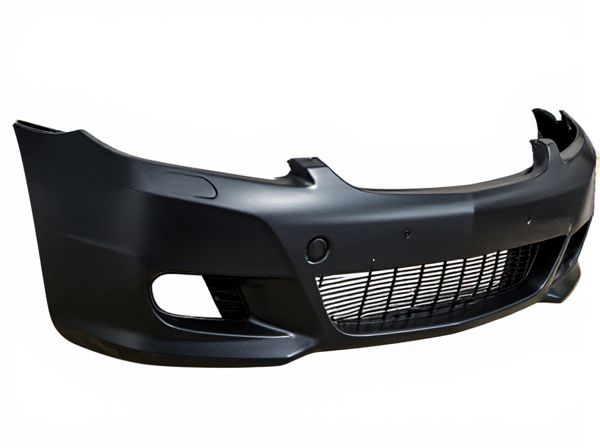
Photo illustration: Tuning bumper vs Factory bumper
Tuning bumpers enhance your vehicle's aesthetic appeal and aerodynamics, often featuring unique designs and materials that improve performance and style beyond factory specifications. Factory bumpers prioritize durability, safety, and compliance with regulations, ensuring reliable protection during impacts. Choosing between a tuning bumper and a factory bumper depends on whether you prioritize personalized look and performance or standardized safety and functionality.
Table of Comparison
| Feature | Tuning Bumper | Factory Bumper |
|---|---|---|
| Material | Fiberglass, ABS plastic, carbon fiber | Reinforced plastic, steel, aluminum |
| Design | Aerodynamic, sporty, customizable | Standardized, functional, OEM design |
| Durability | Moderate; depends on material quality | High; tested for impact resistance |
| Cost | Moderate to high, depending on customization | Lower; included in vehicle price |
| Installation | Requires modification and expert fitting | Plug and play; factory installed |
| Performance | Improves aerodynamics and style | Optimized for safety and regulations |
Key Differences Between Tuning and Factory Bumpers
Tuning bumpers are custom-designed for enhanced aesthetics and improved aerodynamics, often featuring aggressive styling and lightweight materials, whereas factory bumpers prioritize durability and compliance with safety standards set by manufacturers. Factory bumpers are engineered for optimal impact absorption and integration with vehicle safety systems, while tuning bumpers may compromise these features to achieve a sportier look or better performance. Additionally, tuning bumpers often require aftermarket fitting adjustments, unlike factory bumpers that come pre-fitted and aligned for specific vehicle models.
Material Quality: Tuning vs Factory Bumpers
Tuning bumpers often use high-quality polyurethane or fiberglass composites, offering enhanced flexibility and resistance to impact compared to factory bumpers, which typically employ standard thermoplastic materials like polypropylene. The superior material composition in tuning bumpers allows for better durability and customization options, catering to performance and aesthetic upgrades. However, factory bumpers benefit from rigorous OEM testing standards, ensuring optimal safety compliance and long-term reliability.
Design and Aesthetics Comparison
Tuning bumpers offer customized designs that emphasize aggressive lines, unique shapes, and enhanced aerodynamics compared to standard factory bumpers, providing a sportier and more personalized appearance. Materials used in tuning bumpers often include lightweight composites or carbon fiber, allowing for intricate styling and improved visual impact. Factory bumpers prioritize uniformity, safety regulations, and mass-market appeal, featuring simpler designs that maintain the vehicle's original aesthetic without emphasizing bold or distinctive elements.
Performance Impact: Tuning vs Stock Bumpers
Tuning bumpers often enhance aerodynamic efficiency by optimizing air flow, resulting in improved vehicle stability and reduced drag compared to factory bumpers. Performance-oriented materials like carbon fiber or fiberglass used in tuning bumpers contribute to significant weight reduction, positively impacting acceleration and handling. In contrast, factory bumpers prioritize durability and regulatory compliance, which may limit their contribution to high-performance dynamics.
Installation Process and Compatibility
Tuning bumpers often require modifications during the installation process, such as trimming or drilling, to fit properly on specific vehicle models, whereas factory bumpers are designed for direct bolt-on installation with precise compatibility. Factory bumpers ensure seamless alignment with existing mounting points and integrated components like sensors and airbags, while tuning bumpers may need additional adjustments or adapters to maintain functionality. Compatibility issues with tuning bumpers can arise due to differences in material thickness, shape, and mounting hardware, making them less plug-and-play compared to OEM parts.
Cost Analysis: Tuning Versus Factory Options
Tuning bumpers often offer a cost-effective alternative to factory bumpers, with prices varying widely based on material quality and customization levels, typically ranging from $200 to $1,000 compared to factory bumpers that can cost $500 to $2,500 or more. Installation costs for tuning bumpers may be lower due to simpler designs, but potential compatibility issues can lead to additional expenses, while factory bumpers guarantee fit and finish with possibly higher labor costs. Long-term durability and resale value also influence total cost, as factory bumpers often retain value better, whereas tuning bumpers provide budget-friendly aesthetic upgrades without matching OEM standards.
Durability and Longevity Considerations
Tuning bumpers often use reinforced materials such as fiberglass or polyurethane composites, enhancing durability against minor impacts and wear compared to many factory bumpers made from standard plastic compounds. Factory bumpers are engineered to meet rigorous safety and durability standards, ensuring consistent longevity under typical driving conditions and compliance with regulatory crash tests. While tuning bumpers offer improved resistance to scratches and deformation for performance-focused vehicles, factory bumpers generally provide better overall long-term resilience due to their integration with the vehicle's original design and crash absorption systems.
Safety Features and Crash Protection
Tuning bumpers often enhance aesthetic appeal but may lack rigorous crash-test certification, potentially compromising safety features like energy absorption and impact distribution compared to factory bumpers engineered to meet stringent automotive safety standards. Factory bumpers incorporate advanced materials and design technologies, such as reinforced steel beams and optimized crumple zones, to mitigate collision forces and protect both pedestrians and vehicle occupants. Research indicates that professionally designed factory bumpers provide superior crash protection by maintaining structural integrity and reducing injury risk during low to moderate-speed impacts.
Aftermarket Support and Customization
Tuning bumpers offer extensive aftermarket support with a wide range of customization options that allow car enthusiasts to enhance performance, aerodynamics, and aesthetics beyond factory specifications. Unlike factory bumpers, which prioritize OEM standards for safety and fitment, tuning bumpers often incorporate advanced materials and designs tailored for specific performance goals and individual style preferences. The robust aftermarket ecosystem surrounding tuning bumpers provides access to specialized parts, finishes, and modifications unavailable through standard manufacturer channels.
Choosing the Right Bumper for Your Vehicle
Selecting the right bumper for your vehicle depends on your priorities such as durability, aesthetics, and functionality. Tuning bumpers offer customization options and enhanced appearance tailored to specific styles, often made from lightweight materials ideal for sportier looks. Factory bumpers prioritize safety, regulatory compliance, and original equipment fitment, ensuring seamless integration and optimal protection during collisions.
 caratoz.com
caratoz.com